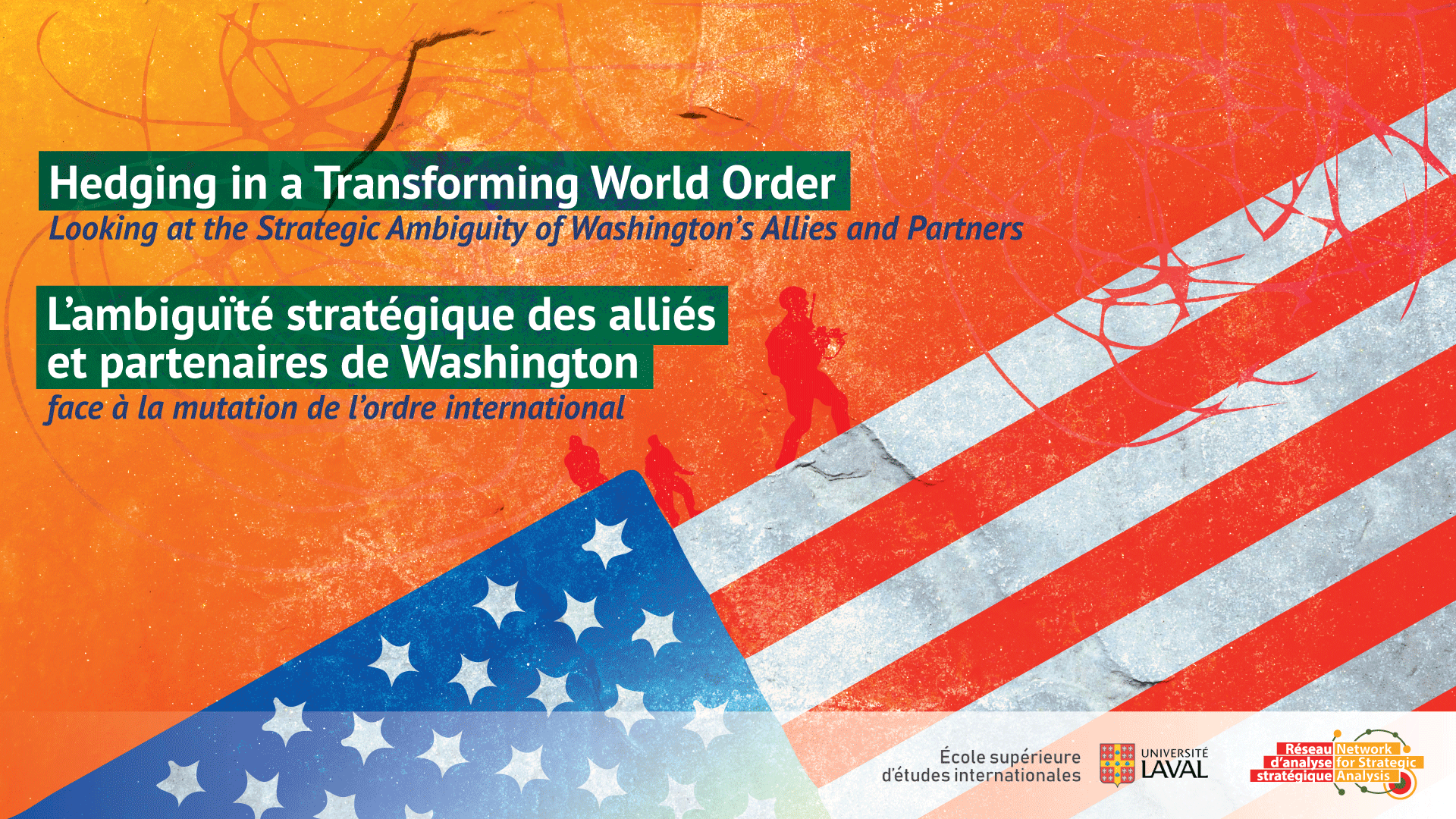Download the Program (PDF 985kb)
Many question the ability of the United States to maintain its global leadership in the face of the relative decline of its power and the emergence of the BRICS, particularly China. In recent years, an increasing number of Washington’s allies have displayed strategic ambiguity (or hedging) regarding their strategic behaviour in a changing world. For instance, France has favored a Europe « neither aligned nor vassalized before any power », to borrow Emmanuel Macron’s words. Other allies, such as Italy and Hungary, have developed close relations with China and Russia, which raises concerns in Washington. Finally, like the Philippines and Turkey have even threatened to sever their alliance with the United States to realign with China and Russia.
The aggression of Russia against Ukraine appears to have accelerated the transformation of the global order. Many observers characterize this system as a « multi-order world » or post-American, where allies have more latitude to express their divergences and interests. For example, Turkey abstained from joining the Western regime of sanctions against Moscow, and Hungary refused to condemn the Russian aggression, despite both being NATO members. This conflict has also revitalized the Non-Aligned Movement, which refuses to choose between the United States on one side and Russia and China on the other. This is evidenced by the United States’ inability to rally a majority of countries from the Global South to its policy of support for Ukraine, as well as the resistance of some states to adopt restrictive measures towards China in the context of Sino-American competition.
In this context, this conference, co-organized by the NSA and the Graduate School of International Studies, has two main objectives. First, to identify and explain the ambiguous behaviors of some of Washington’s allies and evaluate the reaction of the United States to these behaviors. Second, this conference aims to shed light on the Non-Aligned States, primarily those in the Global South, and the various geopolitical realities that drive their strategies.
Agenda:
10h00 – 10h10: Opening Remarks
-
- Jonathan Paquin, Co-director – Network for Strategic Analysis
- Jonathan Paquin, Co-director – Network for Strategic Analysis
10h10 – 12h00: Panel 1 : Transition of Power and Strategic Ambiguity of Washington’s Allies
Moderator: Frédérick Côté – Ph.D. Candidate, International Studies, École supérieure d’études internationales
-
- Alexander Lanoszka – Associate Professor, Department of Political Science, University of Waterloo
Title: Are U.S. Allies and Partners Really Hedging?
-
- Pierre Colautti – Ph.D. Candidate, Department of Political Science, Université Laval à Québec
Title: US Allies’ Response to Washington’s Lack of Security Assurance Under the Obama and Trump Presidencies
-
- Émile Lambert-Deslandes – Ph.D. Candidate, Department of Political Studies, Queen’s University
- Émile Lambert-Deslandes – Ph.D. Candidate, Department of Political Studies, Queen’s University
Title: Nuclear Hedging and Latency: The Historical Cases of US Allies
-
- Nicolas-François Perron-Giroux – Doctoral Student, Université du Québec à Montréal (UQAM)
Title: The Implications of Power Transition on Canadian Defence Policy: Diplomatic Signals and Military Acquisitions.
12h00 – 13h15: Lunch
13h15 – 15h15: Panel 2 : Understanding the Interests of Southern States in Relation to the Great Powers
Moderator: Talbot Imlay – Full Professor, Department of History, Université Laval
-
- Amabilly Bonacina, Doctoral Candidate in Political Studies, Université de Montréal
- Amabilly Bonacina, Doctoral Candidate in Political Studies, Université de Montréal
Title: The Foreign Policy of Lula 3: Between the Challenges of a Brazil in Reconstruction and a Changing World
-
- Roromme Chantal, Associate Professor of Political Science, École des hautes études publiques (HEP), Université de Moncton
Title: Global China and Symbolic Power: The Case of the Indo-Pacific Region
-
- Amélie Chalivet, Joint Doctoral Student, Université Paris 2 Panthéon-Assas et à l’Université du Québec à Montréal
Title: India and the Challenges of Taiwan and the South China Sea: Case Studies of India’s Evolving Strategic Ambiguity.
-
- Jean F. Crombois, Associate Professor of European Studies, American University of Bulgaria
Title: Bulgarian Foreign Policy and the War in Ukraine: towards a more assertive pro-Western Foreign Policy?
15h15 – 15h25: Closing Remarks
-
- Jonathan Paquin, Co-director – Network for Strategic Analysis





Comments are closed.